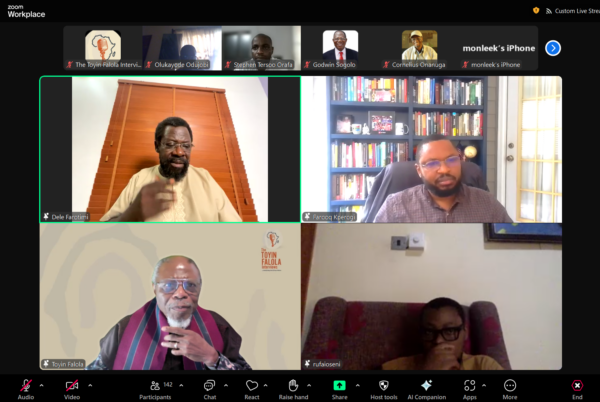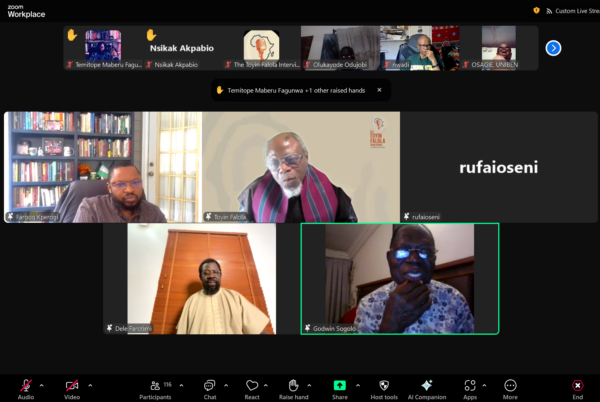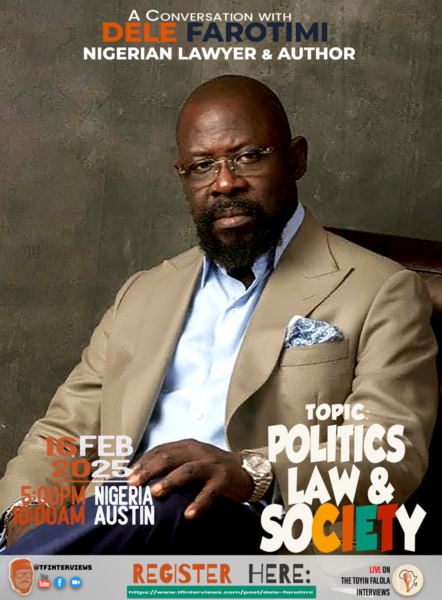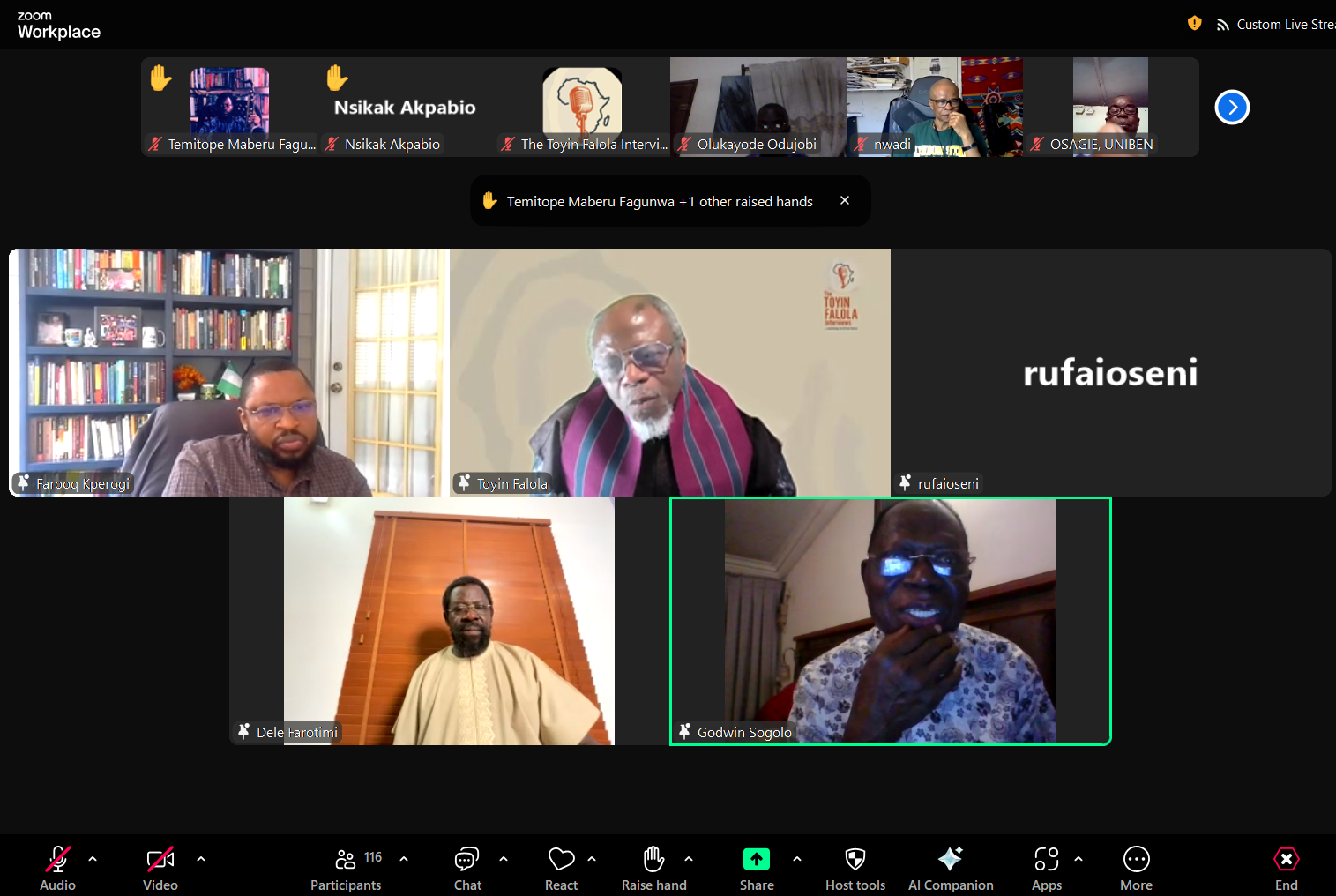Godwin Sogolo
The Toyin Falola Interviews are fast becoming the most interesting and valuable contributions to the discourse on Nigeria’s political and socio-economic predicament. On Sunday, 16th February, 2025, I was privileged to join in one of these interviews, featuring three of the most brilliant Nigerian professionals: Dele Farotimi, Rufai Oseni and Farooq Kperogi.
Naturally, those familiar with recent happenings as reported in the Nigerian social media, would have expected the conversation to focus, majorly or entirely, on the travails of Farotimi, following the publication of his book on the Nigerian judiciary. Well, that matter was mentioned, but only as an instance of the larger conflagration already engulfing the Nigerian state.

The bulk of the discussion centred on how Nigeria became what she is today. More specifically, the 200-plus discussants had various reasons including historical background, years of colonialisation, poverty, illiteracy, ethnic diversity, etc. Many touched on the predicament of vulnerable Nigerians under the grip of a powerful political class and its oligarchic support base who thrive on impunity.
One of the common issues raised was the challenge of leadership, arising, specially, from Nigeria’s faulty electoral processes. For instance, it was, almost, generally agreed that in Nigeria “votes do not count” during elections, and that elections – whenever they hold – are so flawed that the citizens are never given the opportunity to choose their own leaders. Consequently, those who emerge by fraudulent means do not feel accountable to the electorate.
The issues of vote-buying featured prominently, the allegation being that Nigerian election venues have increasingly become trading arenas for the buying and selling of votes. In the end, the winners are simply the highest bidders. The logic is clear: having bought or captured the votes, what stops the politicians from buying or capturing the state, from putting the citizens into his pocket, and what stops them from locking their victims up at will? That, in brief, is the source of the impunity and oppressive tendencies among the nation’s politicians and state actors.
Nigerian political leaders are, on the average, power-drunk and have a high tendency of weaponising state instruments, including the military, police and the judiciary. They intimidate, harass and victimise vulnerable citizens for no justifiable reasons. All that would have been understandable, if the nation were still under colonial rule or in a military dictatorship, both of which we have since left behind. As far back as 1999, Nigeria embarked on the Fourth Republic, believing that we were embracing an acceptable democratic system, with the attendant values of all freedoms, human rights, the rule of law, protection from arbitrary arrest, etc., and all that is associated with any decent human society of the 21st century. How wrong!
Many of us, even the so-called educated elite, had the illusion that setting up the institutions of democracy – with a loud proclamation of its values – was all that was needed to be a democratic nation. And, we were totally blinkered from the historical fact that the same democratic institutions produced dictators such as Adolf Hitler and Benito Mussolini. If these historical facts are too distant as a reference point, what about the recent election of Donald Trump of America who assumed office less than a month ago?
Was it not because Nigeria saw great value in the American republican system that we adopted it in 1963 as a replacement for the British parliamentary system? Yet, it has taken many decades to realise that “all that glitters is not gold”. Nigerians abreast with current affairs would recall that Trump, in preparation for his second coming, carefully mapped out his strategies for capturing the presidency. The method he adopted was to deploy raw cash and strength. That is why he gathered the wealthiest men in the world: Elon Musk, Mark Zuckerberg, Tim Cook, Jeff Bezos, Rupert Murdock and others.
True, Western politicians have always condemned the role of oligarchs in the politics of other regions, especially, Russia, but, it has all been a game of hypocrisy. In any case, Trump has always been a great admirer of the Russian leader, Vladimir Putin, who had his first taste of the Russian presidency as far back as 1999, following the resignation of Boris Yeltsin. And, when Trump said, openly, during the campaigns for his second election to the White House that he admired Putin, and that he would be a dictator on day-one, many thought the man was joking.

Yet, when Trump assumed office last month, he immediately embarked on a rash of decisions which include the deportation of undocumented immigrants; cancellation of birth-right citizenship; arbitrary imposition of tariffs against friends and adversaries; changing of names of locations, for example, from Gulf of Mexico to Gulf of America, etc. And, like a true oligarch, Trump declared his intentions to buy or acquire independent sovereign nations, including Panama, Iceland and Gaza. For Trump, sovereign nations are purchasable commodities, insofar as the buyer can afford to pay! More than ever, I am convinced that excessive money in the possession of some men induces madness.
Again, if America sounds too distant, come home to our own democracy. Haven’t we heard about State Governors who were able to acquire almost the entire properties of their States or political leaders who stretch their acquisitive urge to national monuments?
The difference between the American situation and ours is that the former has an inbuilt capacity to repel aberrations while we do not. The Constitution of the United States is 237 years old. Over the years, the document has undergone rigorous tests; regular scrutinies, reviews and modifications by experts, through legal proceedings and judicial pronouncements. By undergoing these processes, the American Constitution purges out whatever or whoever contradicts its fundamental principles. Therefore, if Trump or whatever he does, is in conflict with the Constitution, he or his actions will certainly be thrown out, no matter how long it takes.
Another difference between the American system and that of Nigeria is that the former thrives on the rule of law which protects the weak and vulnerable while in our clime, the rule of law operates only for those who can afford it.
Note that reference to the American situation, here, is only in passing, as our focus is on the predicament of Nigerians. As we approach the 2027 general elections, one can only hope that Nigerians will have the opportunity to elect leaders of their choice. It means that, by that time, fraudulent elections would have been a thing of the past, and that ballot snatching, and vote buying would have stopped.

It is also worth stating that vote trading is an affair between two parties: the buyer and the seller. Without one, there cannot be the other. Therefore, while the corrupt politician is culpable in offering to buy votes, the electorate has the moral obligation to reject the offer which amount to selling his/her conscience, mandate and future of generations to come.
However, one has to evangelise this message with a great deal of caution, knowing the devastating damage done to the integrity and moral judgement of Nigerians by extreme poverty. Will Dele Farotimi, Rufai Oseni or Farooq Kperogi go to the polling unit on an election day to offer an alternative means to a starving Nigerian electorate prepared to sell his vote, and if so, how many poor Nigerians can these men rescue? Herein lies the national predicament.
Godwin Sogolo
Emeritus Professor of Philosophy
National Open University of Nigeria
Abuja.

Comparing the American political structure to that of Nigeria is actually devastating to the later. The American political system gives room for highly educated candidates who prove their capacities before the election. Nigeria on the other hand sees wealth and influence as a criteria to emerge as a candidate. Certificates presented during screening are in most cases forged and lack authenticity. The corrupt electorates overlook these faulty and approves such a candidate.
The party system of politics is another major challenge of the Nigerian politics.
The independent national electoral commission (inec) is at the mercy of the government hence they can told what to do as was in the case of the 2023 general elections.
Conclusively, paper qualification should be a major factor in approving a candidate during screening and every candidate should be mandated to be involved in series of debates before the election, dissolve the party system of politics in Nigeria and grant INEC total freedom(autonomy to pilot her affairs with out external influence)